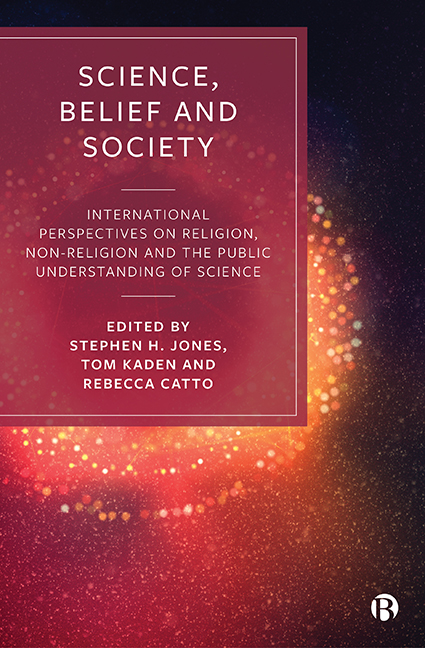 Science, Belief and Society
Science, Belief and Society Book contents
- Frontmatter
- Contents
- List of Figures and Tables
- Notes on Contributors
- Editors’ Acknowledgement
- Foreword
- Editors’ Introduction: Science, Belief and the Sociological Tradition
- PART I Methodological Challenges in the Study of Science and Belief
- PART II Belief in the Study of Science and Technology
- PART III Science, Culture and Non-religion
- PART IV Religion, Conflict and Moderation
- Conclusion: Future Directions in the Sociological Study of Science and Belief
- Index
2 - Survey-based Research on Science and Religion: A Review and Critique
Published online by Cambridge University Press: 27 April 2022
- Frontmatter
- Contents
- List of Figures and Tables
- Notes on Contributors
- Editors’ Acknowledgement
- Foreword
- Editors’ Introduction: Science, Belief and the Sociological Tradition
- PART I Methodological Challenges in the Study of Science and Belief
- PART II Belief in the Study of Science and Technology
- PART III Science, Culture and Non-religion
- PART IV Religion, Conflict and Moderation
- Conclusion: Future Directions in the Sociological Study of Science and Belief
- Index
Summary
Introduction
A renewed theoretical and empirical programme at the intersection of science and belief must begin by taking stock of our present resources. This chapter provides a top-level overview of the surveybased empirical data currently available. The goal is not to provide a traditional ‘literature review’ of existing studies, but rather to give an assessment of the data themselves – their substantive focus, promise and limitations. Moreover, this is not an exhaustive, encyclopaedic account of every survey measure related to science and religion. That would surely require its own volume. Instead, I focus on direct attempts to measure public attitudes about the relationship between science and religion. Practically, this means that I limit myself to measures of the so-called ‘conflict thesis’ (see the Introduction to this volume) and beliefs about evolution and human origins. I also limit my analyses to probability samples of the general population in the US (where the overwhelming bulk of this research has been conducted). Despite these caveats and boundaries, several important features of and limitations to the existing data emerge from this review. In short, I find that certain measures work well at a basic descriptive level but many of the important questions about why segments of the population hold to some positions and not others may require new measures and research strategies. The chapter concludes with some specific suggestions for what forms these new directions might take, many of which are taken up in various ways in the remaining contributions to this volume.
Survey items on the conflict thesis
In 1957, the National Association of Science Writers (NASW) sponsored a national poll on the American public's interest in science and technology (Davis, 1957). The Institute for Social Research at the University of Michigan administered it just a few months before Sputnik I launched. The survey instrument that was developed formed the basis for numerous public opinion questions that were later replicated in the US and around the world. In 1978, after a period of relative silence on these topics in national surveys, the National Science Foundation (NSF) recruited the political scientists Jon Miller and Kenneth Prewitt to design a national survey to follow up the original 1957 study (Miller et al, 1980). The NSF's Surveys on Public Understanding of Science and Technology were regularly administered between 1979 and 2001.
- Type
- Chapter
- Information
- Science, Belief and SocietyInternational Perspectives on Religion, Non-Religion and the Public Understanding of Science, pp. 25 - 54Publisher: Bristol University PressPrint publication year: 2019


